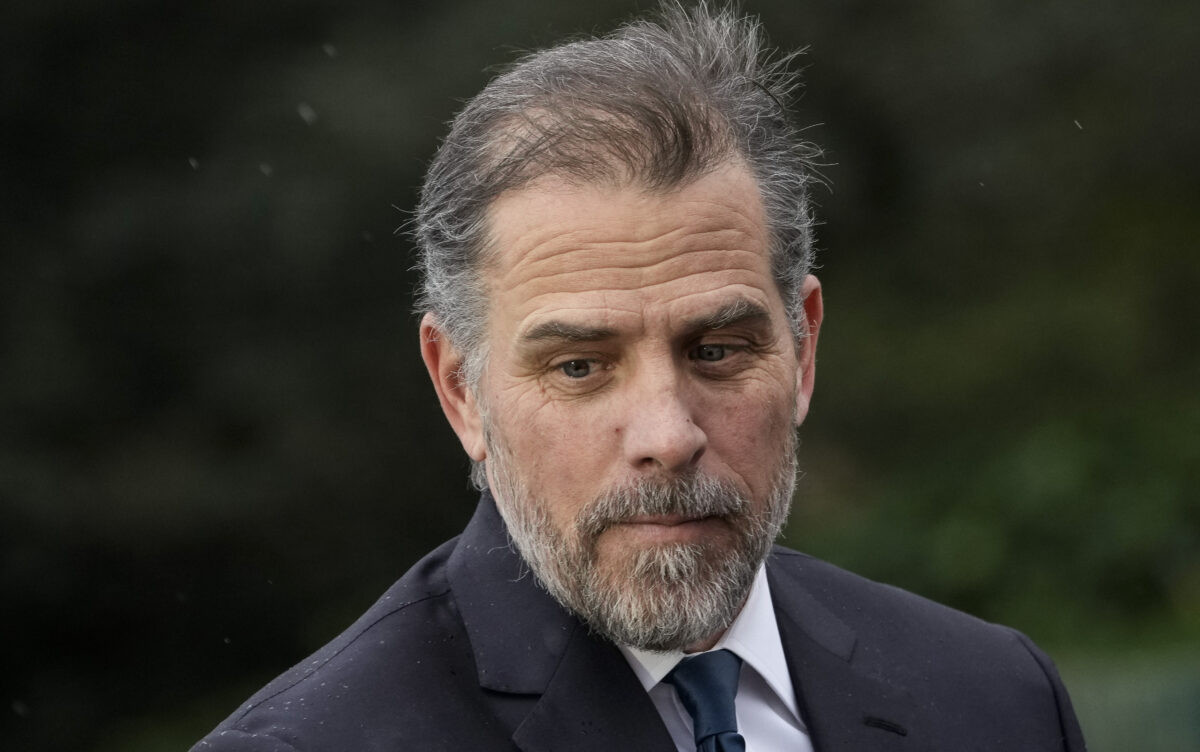

The Internal Revenue Service (IRS) removed a whistleblower and his team from a criminal investigation into Hunter Biden’s taxes and business dealings, at the request of the Department of Justice, according to the whistleblower’s attorneys.
“Today the [IRS] Criminal Supervisory Special Agent we represent was informed that he and his entire investigative team are being removed from the ongoing and sensitive investigation of the high-profile, controversial subject about which our client sought to make whistleblower disclosures to Congress,” the whistleblower’s lawyers said in a May 15 letter (pdf) addressed to multiple congressional lawmakers, first obtained by Just the News.
“He was informed the change was at the request of the Department of Justice.”
Hunter Biden, President Joe Biden’s son, has been under federal investigation for alleged tax fraud, lobbying crimes, and money laundering.
He confirmed back in December 2020 that his business deals were being investigated. Few details have been revealed about the probe since then.
The Epoch Times has reached out to the Department of Justice for comment.
The unnamed IRS agent had been overseeing an “ongoing and sensitive investigation of a high-profile, controversial subject since early 2020,” his lawyer, Mark D. Lytle, a former DOJ lawyer told Congress on April 19 (pdf).
Although that letter didn’t mention Hunter Biden by name, Sen. Lindsey Graham (R-S.C.) said in an April 20 interview on Fox News that the whistleblower was bringing information about a potential conflict of interest with the Hunter Biden investigation.
The IRS’s removal of the whistleblower from the criminal probe into Hunter Biden is “clearly retaliatory and may also constitute obstruction of a congressional inquiry,” Lytle and another attorney, Tristan Leavitt, told lawmakers in the May 15 letter.
The May 15 letter was addressed to Democrat chairmen and top Republicans on the Senate Finance and Judiciary committees, and the Republican chairman and top Democrats on the Judicial and House Ways and Means committees.
In the April 19 letter, Lytle said his client “would like to make protected whistleblower disclosures to Congress.”
Lytle said at the time, his client had already provided “legally protected disclosures” internally at the IRS, the U.S. Treasury Inspector General, the Office of Inspector General, and the Department of Justice.
The disclosures alleged that federal prosecutors had, in part, failed to “mitigate clear conflicts of interest in the ultimate disposition of the case,” he wrote.
The Biden administration also engaged in “preferential treatment and politics improperly infecting decisions and protocols that would normally be followed by career law enforcement professionals in similar circumstances if the subject were not politically connected,” he added.
By late April, lawmakers in Congress were reviewing the whistleblower’s allegations. And by early May, they were also making plans to carry out a transcribed interview with him in the coming days, reported Just the News.
The whistleblower’s two lawyers said the IRS’s move contradicts what IRS Commissioner Daniel Werfel testified in Congress on April 27—that “there will be no retaliation for anyone making an allegation or a call to a whistleblower hotline.”
“We respectfully request that you give this matter your prompt attention. Removing the experienced investigators who have worked this case for years and are not the subject-matter experts is exactly the sort of issue our client intended to blow the whistle on to begin with,” they told the lawmakers.
Lytle and Leavitt also noted that under federal law, the IRS whistleblower “is protected … from retaliatory personnel actions—including receiving a ‘significant change in duties, responsibilities, or working conditions’ (which this clearly is) because of his disclosures to Congress.”
“Any attempt by any government official to prevent a federal employee from furnishing information to Congress is also a direct violation of longstanding appropriations restrictions,” they added. “Furthermore, [federal law] makes it a crime to obstruct an investigation of Congress.”
Cc’ed in the May 15 letter were Department of Justice Inspector General Horowitz, Attorney General Merrick Garland, Treasury Inspector General for Tax Administration Russell George, IRS Commissioner Werfel, and Special Counsel of the U.S. Office of Special Counsel Henry Kerner.
Savannah Pointer contributed to this report.




Discount Applied Successfully!
Your savings have been added to the cart.